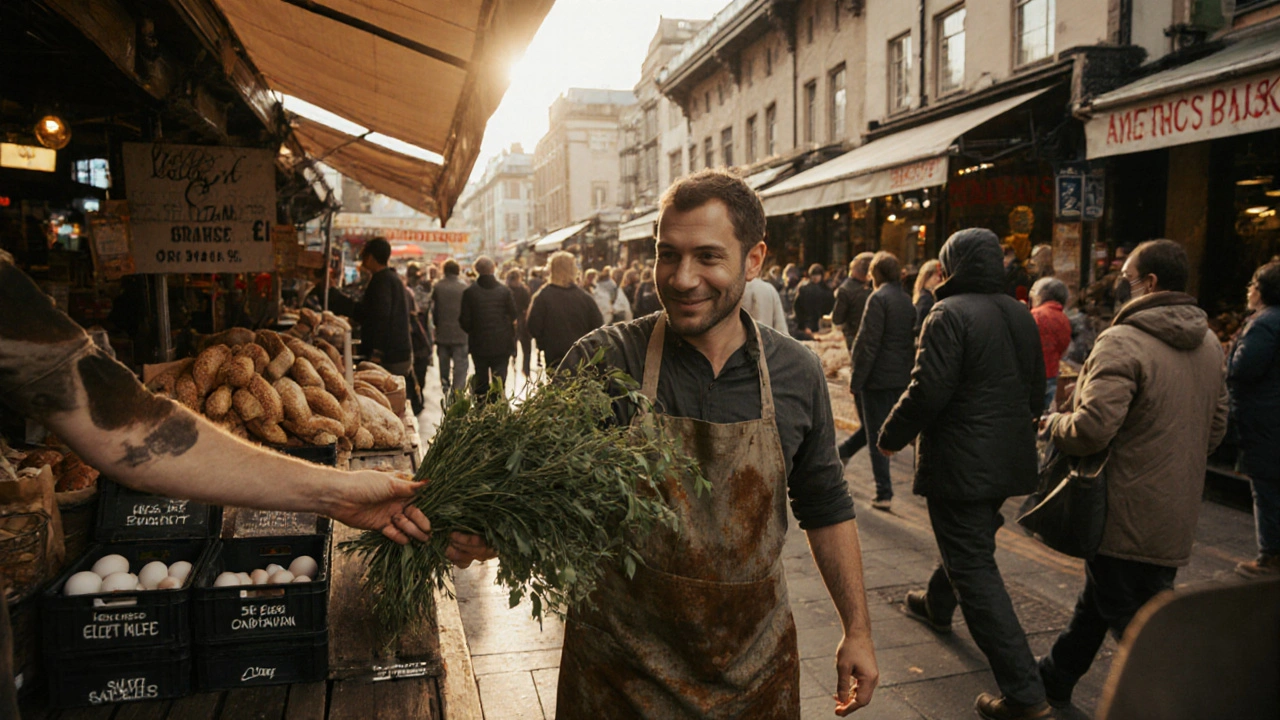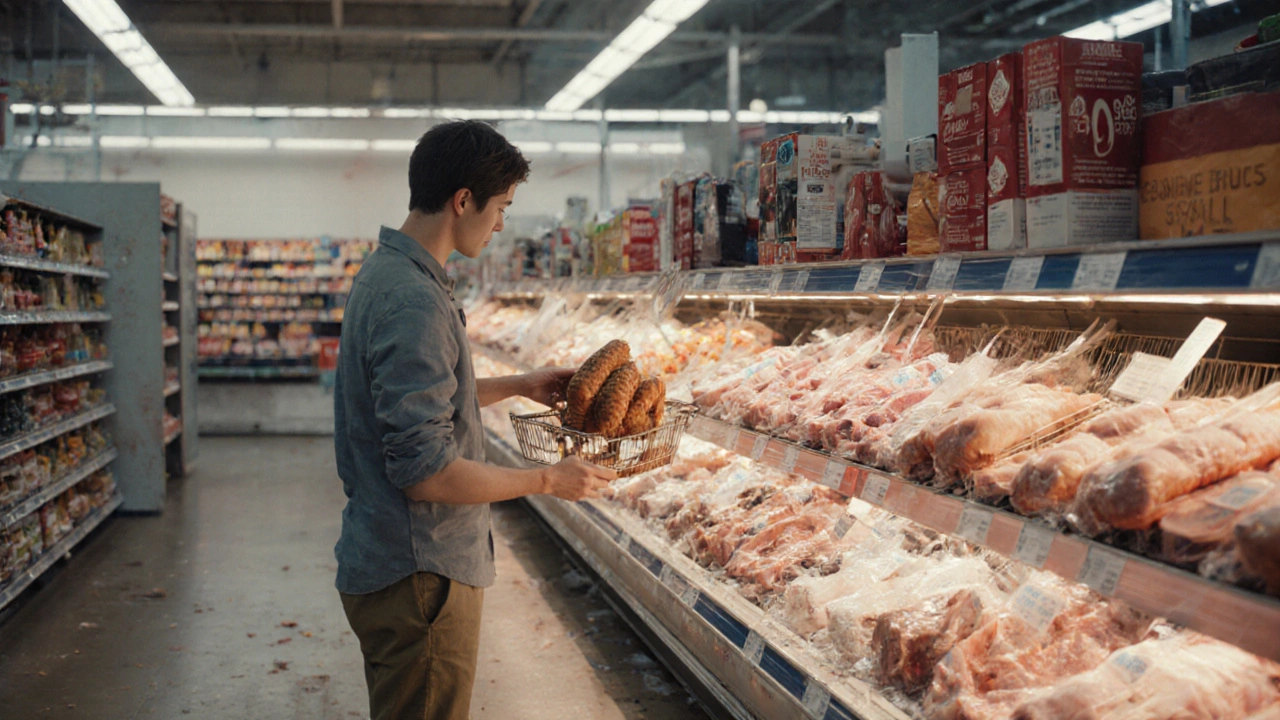Want to cut your grocery bill in London without switching to instant noodles? The truth is, when you shop matters just as much as where you shop. A trip to a supermarket at 7 p.m. on a Friday could cost you 30% more than the same basket bought at 8 a.m. on a Tuesday. And markets? They’re not just for tourists-they’re where locals get the best deals, if you know when to show up.
Supermarkets: When Prices Drop (And When They Spike)
London’s big chains-Tesco, Sainsbury’s, Asda, Aldi, Lidl-don’t just change prices randomly. They follow a pattern based on stock turnover, waste reduction, and customer traffic.
Here’s the real timeline:
- Evenings (7 p.m. to closing): This is when most stores mark down perishables-meat, fish, dairy, baked goods, and salad. Staff get a 30-minute window to tag items that won’t sell by midnight. If you arrive right after closing time, you might find half-price rotisserie chickens or discounted yogurts. But be quick: the best stuff goes fast.
- Monday mornings (8 a.m. to 10 a.m.): After Sunday’s rush, shelves are restocked. Prices are full, but you’ll find the freshest produce. Not a deal, but a safety net if you need quality.
- Tuesdays and Wednesdays (early afternoon): These are the sweet spots. Stores run midweek promotions to clear last week’s overstock. Aldi often drops prices on seasonal fruit and vegetables around 2 p.m. on Wednesdays. Tesco’s ‘Price Drop’ app sends alerts for items marked down that day.
- Fridays and Saturdays (11 a.m. to 6 p.m.): Peak pricing. Crowds, full shelves, and zero discounts. Avoid if you’re budgeting.
A 2024 survey by London Food Bank showed that shoppers who timed their trips to after 7 p.m. on weekdays saved an average of £18 per week on a typical basket of 20 items. That’s £936 a year-enough to cover a monthly Tube pass.
Markets: The Hidden Discount Hubs
Markets in London aren’t just about spices and street food. They’re live auction houses for fresh food, run by small vendors who need to sell by closing.
Here’s how to win at markets:
- Camden Market (Tuesday-Sunday): Arrive after 4 p.m. on Sundays. Vendors packing up will slash prices on fruits, cheese, and bread. One vendor told me he’ll give 50% off if you take three bags.
- Borough Market (Tuesday-Saturday): The last hour before closing (6 p.m. on weekdays, 5 p.m. on Saturday) is gold. You’ll find £1 bundles of herbs, half-off artisan bread, and discounted free-range eggs. Don’t be shy-ask if anything’s going cheap.
- Old Spitalfields Market (Thursday-Sunday): Best deals on Thursdays after 3 p.m. Fishmongers drop prices on unsold seafood. One stall sold £12 whole sea bass for £3 by 5:30 p.m.
- Walthamstow Market (Tuesday-Sunday): The most local, least touristy. Tuesdays and Wednesdays are quiet, so vendors are eager to sell. Look for 3-for-£1 apples, £1.50 bags of potatoes, and fresh meat at 40% off by 5 p.m.
Unlike supermarkets, market prices aren’t locked in. Vendors adjust on the fly. If you show up late and smile, you’ll get better deals than anyone clicking ‘Buy Now’ online.
Supermarkets vs Markets: A Real-World Comparison
Let’s say you’re buying a basic basket: 1kg chicken breast, 1kg tomatoes, 1 loaf bread, 1L milk, 6 eggs, and a bunch of spinach.
| Item | Supermarket (Regular Price) | Supermarket (Discounted Evening) | Market (Late Closing) |
|---|---|---|---|
| 1kg chicken breast | £7.50 | £4.00 | £3.50 |
| 1kg tomatoes | £3.20 | £2.00 | £1.80 |
| 1 loaf bread | £1.80 | £0.90 | £0.80 |
| 1L milk | £1.10 | £0.80 | £0.70 |
| 6 eggs | £2.50 | £1.50 | £1.20 |
| 1 bunch spinach | £1.60 | £0.80 | £0.60 |
| Total | £17.70 | £10.00 | £8.60 |
Markets win by £1.40. But here’s the catch: you need to go late, know where to look, and carry a reusable bag. Supermarkets are easier-but only if you time it right.

Pro Tips for Maximum Savings
- Use the ‘Price Drop’ apps: Tesco, Sainsbury’s, and Asda have apps that show real-time markdowns. Turn on notifications for your local store.
- Go alone: Shopping with others means you buy more. Go solo and stick to your list.
- Buy in bulk at markets: If you see 5kg of potatoes for £2, grab it. Store it in a cool, dark place. You’ll save £1.50 per kg over supermarket prices.
- Don’t fear ‘ugly’ produce: Markets and supermarkets both sell ‘wonky’ fruit and veg at 50% off. It tastes the same. One mum in Peckham told me she feeds her family on nothing but discounted ‘imperfect’ carrots and apples.
- Track your spending: Keep a notebook or phone note of what you bought, where, and how much. After two weeks, you’ll see patterns. You might realize you’re overpaying for milk every Sunday at Sainsbury’s.
Who Should Shop Where?
Not everyone can shop late. If you work 9 to 5, here’s your game plan:
- Working parents: Hit Aldi or Lidl on Tuesday afternoons. Prices are low, crowds are small, and you can get everything in 20 minutes.
- Students: Combine a market visit on Thursday evening with a discount supermarket run on Friday morning. Use student apps like UNiDAYS for extra savings.
- Retirees: Many markets offer senior discounts before noon. Ask. Most vendors don’t advertise it, but they’ll give you 10% off if you mention you’re over 60.
- Meal preppers: Buy proteins and veggies in bulk on market days. Freeze what you don’t use. A £5 chicken from Borough Market lasts three meals.

What You’re Really Buying
When you shop at the right time, you’re not just saving money-you’re supporting local vendors, reducing food waste, and eating better. A £3 chicken from a market isn’t just cheaper. It’s fresher, often locally raised, and not sitting in a warehouse for two weeks.
Supermarkets are convenient. But convenience costs. Markets demand time, but they give back more-better food, lower prices, and a connection to your city’s food rhythm.
The cheapest time to shop in London isn’t a fixed hour. It’s a habit. Show up late. Ask questions. Walk slowly. Look at the tags. And don’t be afraid to walk away if the deal isn’t there. The next one will be.
What time do London supermarkets usually mark down food?
Most major supermarkets in London start marking down perishable items around 7 p.m. on weekdays. This includes meat, dairy, seafood, and baked goods. The best deals are usually in the last 30 to 60 minutes before closing. Aldi and Lidl often have markdowns earlier, around 5:30 p.m., because they turn stock faster.
Are London markets really cheaper than supermarkets?
Yes, especially if you shop late. Markets like Borough, Walthamstow, and Old Spitalfields often sell the same items 15-30% cheaper than supermarkets by closing time. The savings are biggest on fresh produce, bread, and meat. Supermarkets have fixed prices; markets negotiate in real time.
Is it worth going to markets if I work full-time?
It depends. If you can spare one evening a week-say, Thursday after work-you can stock up on essentials at markets and save big. If you’re too tired, focus on midweek supermarket deals (Tuesday-Wednesday afternoons). You don’t need to do both every week. Even one market trip a month cuts your grocery bill noticeably.
Can I find organic food cheaply in London markets?
Yes. Many small vendors at markets like Broadway Market and Greenwich Market sell organic produce directly from farms. Prices are often lower than organic sections in supermarkets because there’s no middleman. Look for stalls with signs like ‘Direct from Kent’ or ‘No plastic, no middleman’-they’re usually the cheapest.
Do all supermarkets in London have the same discount schedule?
No. Aldi and Lidl clear stock earlier (5:30-6 p.m.) because of their fast turnover. Tesco and Sainsbury’s tend to wait until 7 p.m. or later. Asda often has markdowns on Fridays before weekend crowds. Use their apps to track real-time discounts-each chain has its own rhythm.
What’s the best day to shop for fruit and veg in London?
Wednesday is the best day for both supermarkets and markets. Supermarkets restock fresh produce midweek, so you get the best quality. Markets get new deliveries on Tuesday and Wednesday mornings, meaning late-day discounts on Wednesday are the deepest. Avoid Monday-produce is often from the previous weekend and less fresh.
Next Steps
Start small. Pick one market near you. Go on a Thursday evening. Bring a reusable bag. Ask the vendor: “What’s going cheap today?” You’ll get a smile, a discount, and maybe a tip on what’s in season. Do that for four weeks. Then check your grocery receipt from last month. You’ll be surprised how much you saved.
It’s not about being perfect. It’s about being smarter than the average shopper. And in London, where rent eats half your paycheck, every pound saved on groceries matters.
